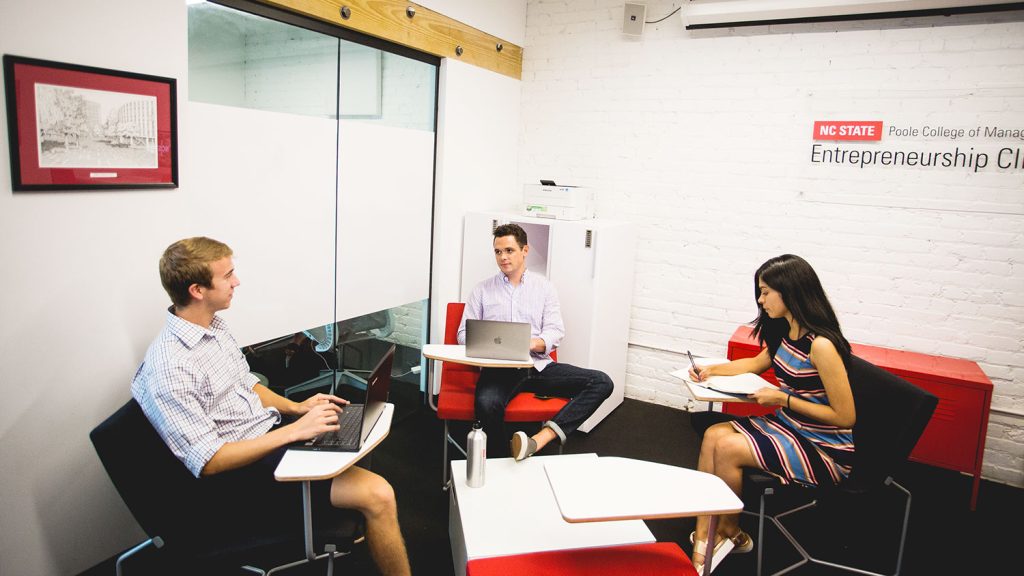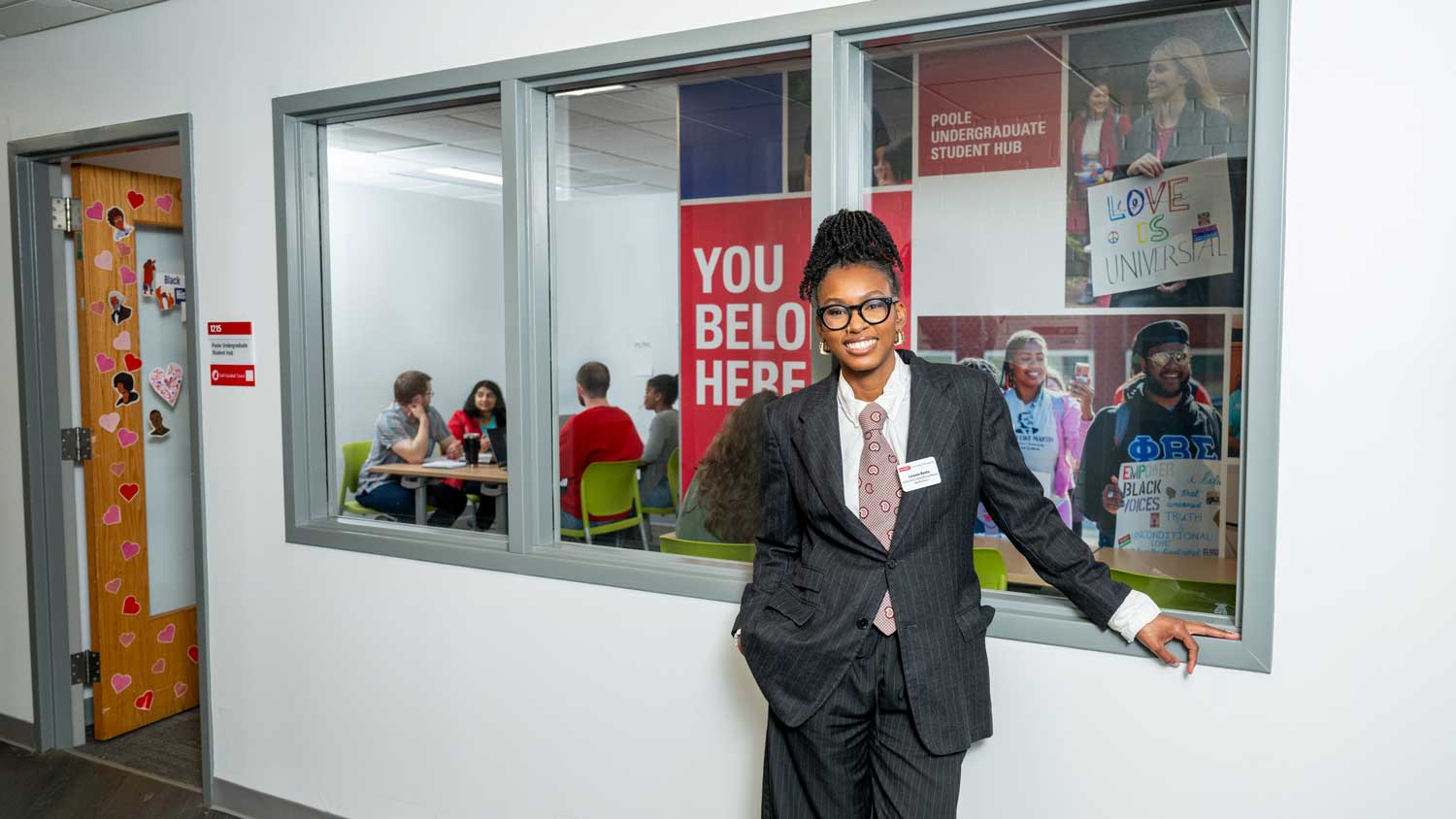Poole’s Initiatives Set College Apart by Connecting Students With Industry
Poole College pursues continual innovation and purposeful collaboration with the Poole Initiatives, five thought-leadership hubs that connect students, faculty and industry.

The 21st-Century Business School
For a business school to stay relevant and impactful today, it must pursue continual innovation and purposeful collaboration with the business community. The Poole College of Management meets that challenge with the Poole Initiatives, five thought-leadership hubs that connect students, faculty and industry.
Our initiatives are the core of what makes us unique in our approach to building a future-focused workforce, resilient businesses and a thriving global economy. They put the “Do” in Think and Do through three key focus areas: experiential education, industry engagement and research.
“The initiatives have definitely helped put Poole College of Management in a unique position relative to our competitors,” said Mark Beasley, KPMG Professor of Accounting and director of the Enterprise Risk Management Initiative. “We’re very applied, we’re very much connected to the real world, and there’s a constant information flow. When I was dialoguing with the chief risk officer of Levi Strauss, giving him information that he needs to take to his board, he asked some questions that also got me thinking. That means when I go teach my class this fall, it’s keeping my teaching very fresh and current.”
“We’re very applied, we’re very much connected to the real world, and there’s a constant information flow.”
The college established each of the initiatives in response to an unmet industry need, bringing students, faculty and companies together to solve problems, generate new ideas and connect talent to jobs.
- The Business Analytics and AI Initiative (BAI) integrates data-driven thinking into every aspect of Poole College. Students can take part in an undergraduate honors program or earn a graduate certificate, and business leaders can engage with the initiative by sponsoring research projects, attending roundtable discussions or serving on the advisory board.
- The Business Sustainability Collaborative (BSC) prepares students and B Corporations — for-profit businesses that meet identified thresholds related to their social and environmental impact — to redefine business success in terms of environmental, social and financial responsibility. The BSC also helps companies achieve B Corp certification.
- The Entrepreneurship Clinic helps faculty, students, entrepreneurs and service providers launch new business ventures in Raleigh. Students work alongside startups and corporations, developing entrepreneurial skills while providing insights to companies. The clinic also helps recent NC State graduates get their businesses off the ground.
- The Enterprise Risk Management Initiative provides executive education and networking, an online resource library, and access to talented students and subject-matter experts to help businesses identify and address risks holistically. Graduate programs prepare students to think critically and strategically to navigate risk.
- The Supply Chain Resource Collaborative (SCRC), home to one of the top 10 graduate supply chain management programs in North America, brings together students, thought leaders and industry professionals to solve supply-chain issues. Business leaders can partner with the SCRC through student practicums and research collaborations.
The initiatives are closely interconnected with our curriculum, and students engage with them through our degree programs — including the brand new Master of Management, Risk and Analytics concentration launching this fall — as well as through special events, clubs and internships. But the most impactful experience they offer to students is the practicum.


Putting Students in the Consultant’s Seat
Students in the Poole College of Management gain more than theoretical knowledge learned in a classroom. Through the Poole Initiatives, students can enroll in innovative, semester-long practicum courses in which they work together to solve a real-world problem that a company or entrepreneur is facing.
“I’ve had students that have said to me, ‘This is the best class I’ve ever taken at NC State,’” said Robert Handfield, Bank of America University Distinguished Professor of supply chain management and executive director of the SCRC. “I think that it’s a huge learning opportunity for students, and they walk away ready to hit the ground running when they graduate and go to work for a company.”
“The companies get this passionate, talented, energized group of students who can help them accelerate their progress. It’s a win-win all the way around.”
In the case of the BSC practicum, students help companies conduct an impact assessment and take steps toward attaining B Corp certification.
“They’re writing policies. They’re gathering data that is providing the company with a road map to improve their water usage or their energy usage. They’re making an impact in real time, and they can see it,” said Jessica Yinka Thomas, director of the BSC and assistant professor of the practice in the Department of Management, Innovation and Entrepreneurship. “The companies get this passionate, talented, energized group of students who can help them accelerate their progress. It’s a win-win all the way around.”
The practicum gives students direct experience solving the kinds of problems they will encounter as professionals, and introduces them to industry leaders who are looking to hire.
“Our evidence shows that those students do well. They get internships which lead to jobs, and they get better-paying jobs,” said Richard Warr, associate dean for faculty and research. “That’s not everything, but it’s a fairly good indication, coming out of college, that you’re going to do well.”
Meeting the Needs of Industry
Close interaction between industry practitioners and students benefits both parties. By engaging business leaders in networking events, executive education, practicums and research partnerships, the initiatives help propel them to the forefront of their professions.
“Executives are looking for insights, market intelligence; they’re looking for talented young people,” said Handfield. “They’re also just looking at an opportunity to engage with other executives and share insights and network, so there’s a lot of benefits that they get from this engagement.”
“We were able to pull that information into a digestible format to help them identify what was happening with treatment, access, caseloads and drugs that are being investigated associated with COVID-19.”
Companies can also partner with the initiatives to develop new tools or research studies. Clinton Health Access partnered with the BAI to develop an artificial intelligence tool to help them collect and interpret data related to the COVID-19 pandemic.
“We were able to pull that information into a digestible format to help them identify what was happening with treatment, access, caseloads and drugs that are being investigated associated with COVID-19,” said Kristin Siebenaler, director of the BAI. “They used this user-friendly interface with the tool to decide how they are going to spend their funds and help connect donors to projects.”
For Max Leisten, CEO and founder of Protopia, the Entrepreneurship Clinic was instrumental in the development and launch of Protopia’s product, an artificial intelligence tool that helps universities connect their students with alumni mentors. Protopia now powers NC State’s Ask the Pack platform.
“NC State and the E-Clinic were there at the inception of Protopia, helping us think through hypotheses, testing these hypotheses and just getting the support from that team to confirm that the existing model for mentorship is broken, that there’s got to be a better way of doing this,” said Leisten. “Being able to test and learn and iterate within the E-Clinic model was invaluable. It really was a very pivotal moment for us.”
Through the clinic, Leisten was able to participate in practicums in which students conducted valuable market research and customer discovery. He also used the clinic as a laboratory to test the AI engine by pairing E-Clinic students with mentors, loosely modeling the platform on the types of interactions students and mentors were having at the clinic’s monthly socials. Today, Protopia is used by universities and entrepreneurship programs around the country. Leisten encourages business leaders and entrepreneurs to take advantage of the resources and talent available through the Poole Initiatives and elsewhere at NC State.
When you look at where NC State is situated in this amazing ecosystem of enterprises, startups and academia, sitting at that epicenter is really a rare opportunity.
“NC State has this amazing ethos of innovation, of ‘Think and Do,’ and there are few institutions that have not only the courage to do this but the resources to do this,” said Leisten. “When you look at where NC State is situated in this amazing ecosystem of enterprises, startups and academia, sitting at that epicenter is really a rare opportunity.”
Moving Business (and NC State) Forward
The initiatives are a key way that Poole College pursues its mission — as well as the strategic priorities of NC State — by preparing students for success, strengthening North Carolina’s business community and generating cutting-edge research.
“So much of the mission and vision of the university is about how we can take all of our resources — the talent, the expertise of our students, our faculty, our broader community — to drive innovation and address our grand challenges,” said Thomas. “But I think there are two areas where we’ve really led and innovated. One is around enhancing the success of our students through educational innovation. Another is around the strategic priority focused on local and global engagement through focused strategic partnerships.”
As a Research 1 land-grant university, NC State serves diverse stakeholders throughout North Carolina and around the world. The initiatives enable Poole College to be responsive to the needs of those stakeholders and take measurable strides toward achieving both the college’s and the university’s strategic goals.
“Everybody’s looking and saying, what is the return on investment from a large university like NC State, and by extension Poole College? And we say, take a look at our initiatives,” said Warr. “Look at the impact they’re having in terms of engaging with industry, advancing it, moving business forward, and helping us train better students, better future employees, for us to grow the economy and to benefit the state as a whole.”
“Look at the impact they’re having in terms of engaging with industry, advancing it, moving business forward, and helping us train better students, better future employees, for us to grow the economy and to benefit the state as a whole.”
As Poole College looks to the future, our initiatives are an area primed for expansion and growth, and expanding the practicum experience is a top priority.
“Our goal is to ensure that all students have these immersive experiences,” said Warr. “That’s a big part of our plan for the future, that we expand this more widely. We really hope that people understand why we’re doing that, and the value of doing it, and support us in this goal.”





